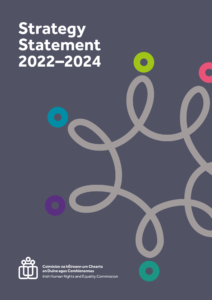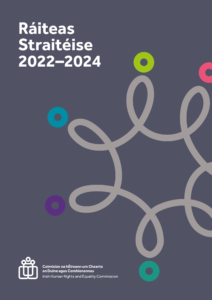Our Strategic Priorities
Strategy Statement 2022-2024
This Strategy Statement identifies the following areas which we believe deserve to be prioritised within the context of our work.
Strategic Priority 1: Economic equality
We will seek greater economic equality in housing, employment, income and for carers
Strategic Priority 2: Justice
We will defend access to justice and the rule of law in the international protection system, in the courts and in the use of public powers
Strategic Priority 3: Respect and recognition
We will promote the eradication of racism, ableism, ageism and sexism through public understanding and State action
Strategic Priority 4: Futureproofing
We will respond to crises that threaten rights and equality, including the COVID-19 pandemic and climate change
Strategic Priority 5: Public Sector Duty
We will encourage, report on and enforce the compliance of public bodies.
Resources
IHREC Strategy Statement 2022 – 2024


